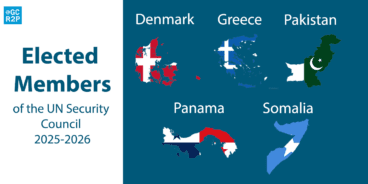
Open Letter to the United Nations Security Council on the situation in Kyrgyzstan
The Security Council must use today‟s briefing by Assistant Secretary-General Fernandez-Taranco as an opportunity to take decisive action to address the dire protection needs of populations at risk of atrocities in Kyrgyzstan. Already 2000 people, primarily ethnic Uzbeks, have reportedly been killed, unknown numbers raped, and 400,000 driven from their homes since June 10th . These atrocities were preventable yet no action was taken to avert or halt them.
Thus far, states, regional organizations, and the Security Council, have appeared content to delay action and point fingers, alleging that others should take the lead in ending the violence. This „wait and see approach‟ in the face of atrocities in Kyrgyzstan is simply unacceptable.
In light of the grave risk of crimes against humanity and ethnic cleansing, the Security Council has a responsibility to act. This is what states pledged to do when they adopted the “responsibility to protect” at the UN World Summit in 2005. At the core of this norm is the obligation to act preventively to protect peoples from genocide, war crimes, crimes against humanity and ethnic cleansing, rather than waiting until atrocities have already occurred, as states have too often done in the past.
For the people of Kygyzstan and the wider region, the time for preventive action is now. It is clear that the Kyrgyz government bears the primary responsibility to protect its population. Yet it continues to be unable to provide adequate protection to the displaced, returnees, and ethnic Uzbek communities, notably in Jalalabad and rural areas.
This failure to protect leaves the internally displaced and returnees vulnerable to attacks and inhibits their ability and desire to return. Many displaced already fear returning to their homes, especially in light of reports that members of the security forces may have participated, or been complicit, in the commission of atrocities. Prolonged displacement risks rendering areas void of ethnic Uzbeks. It creates an environment in which exile breeds radicalization and distrust, creating opportunities for future violence. It exacerbates the suffering of those who have already endured far too much. An international presence is needed to protect those at risk, and ensure that the displaced can safely return home and begin the process of rebuilding their lives, and of reconciliation between communities. The Security Council must authorize an international stabilization mission composed of military and police. Failure to do so will result in more lives lost in the coming days, weeks and months as the tenuous calm that currently prevails is all too fragile and the possible triggers for future violence and atrocities abound.
Ethnic Uzbeks‟ belief that the Kyrgyz security forces will protect them has been deeply eroded. This increases the risk that communities will resort to their own means for protecting themselves — as some already have — including through taking up arms and engaging in violence. The possibility for imminent clashes between ethnic Uzbeks and security forces during the process of dismantling the barricades established by those who remained in ethnic Uzbek areas of Osh, remains real. Already civilians have been killed and injured in the process and there is a risk that the security forces will continue to exercise too heavy a hand.
The ongoing protection and security gap provides ample opportunities for extremist elements within both communities to exploit and perpetrate crimes. As the devastation becomes more apparent and both sides are exposed to radicalizing elements, this in turn may provoke retaliatory attacks by ethnic Uzbeks.
This potential for future violence is exacerbated both by the existence of large groups of perpetrators who have yet to be arrested and can be mobilized to perpetrate atrocities again, and the proliferation of weapons, including those stolen from government depots. A possible moment for such mobilization may be the June 27th referendum. The vote may provide a flashpoint for violence and atrocities, whether from those people disgruntled by the result or denied a chance to participate.
To avert and address these risks, preventive action must be taken immediately by the government of Kyrgyzstan and the Security Council. The government must, with the assistance of international actors, strengthen the security forces‟ capacity to protect. Equally important, the government must use what leverage and influence it has to ensure that its armed forces exercise restraint, respect international law, and that those who are complicit or active in the violence, are held accountable.
Yet government action in itself will not be sufficient, an international stabilization force is needed to prevent and protect. The Organization for the Security and Cooperation of Europe (OSCE) has created a tentative proposal to send 50 to 100 police monitors. While this is a step in the right direction, given the resounding silence to date of the international community, it falls dramatically short of what is needed in light of the level of risk. The silence is all the more shocking given the government of Kyrgyzstan‟s early request for international assistance to address the violence, including a request for military assistance made to the Russian government. Not a single state, nor regional or international organization, including the United Nations, came to their assistance. Had they done so on June 11th or 12th, hundreds of thousands would have remained in their homes, and scores of lives been saved.
The Security Council cannot delay taking action. According to the terms of the 2005 agreement, the Security Council has a responsibility to authorize “timely and decisive measures” to prevent or halt mass atrocities. In this case a timelimited United Nations mandated international force, possibly led by a regional organization or one or more states and consisting of police and military, should be deployed, ideally in advance of the referendum, to provide protection and deter attacks. The force need not number in the thousands but it must be significant and robust enough to be able to deter future attacks and provide physical protection to populations at risk including returnees, displaced people at the border, and ethnic Uzbek communities in Osh, Jalalabad and rural areas. This stabilization force will provide protection but also create a breathing space to allow for the long-term efforts that would be undertaken by a United Nations, European Union or OSCE mission that would replace the force and be mandated to assist in strengthening Kyrgyzstan‟s capacity to prevent and protect. Such a replacement force would focus on: promoting good governance, rule of law, and security sector reform; facilitating mediation, dispute resolution and reconciliation; and be supported by an international police presence.
The Security Council has the opportunity to authorize such a force following today‟s briefing. Additional measures that the Council needs to take include requesting, via a formal public statement, that the government of Uzbekistan open the border. Currently tens of thousands are at the border, unable to cross, thus increasing their vulnerability. The council should also state its commitment to ensuring that the government be given the necessary assistance to receive the refugees.
The Security Council should also make it clear that those who incite, aid or perpetrate crimes will be held accountable as a means of deterring future crimes, and that the government should take the necessary steps to ensure that impunity does not prevail. This will include undertaking a thorough investigation into the violence, including the possible role of state authorities, and prosecuting suspected perpetrators in accordance with international standards.
The Council cannot look the other way or hope that the situation will quickly disappear. Far too many people have lost loved ones, been forced from their homes, and seen their lives irrevocably altered. The seeds of future discontent, violence and atrocities have been sown. The Security Council must take decisive action today to prevent atrocities from occurring tomorrow. The time to act to prevent crimes against humanity and ethnic cleansing and render „never again‟ real is now.
Related Content


Sudan: UN Security Council must take urgent action to protect civilians
